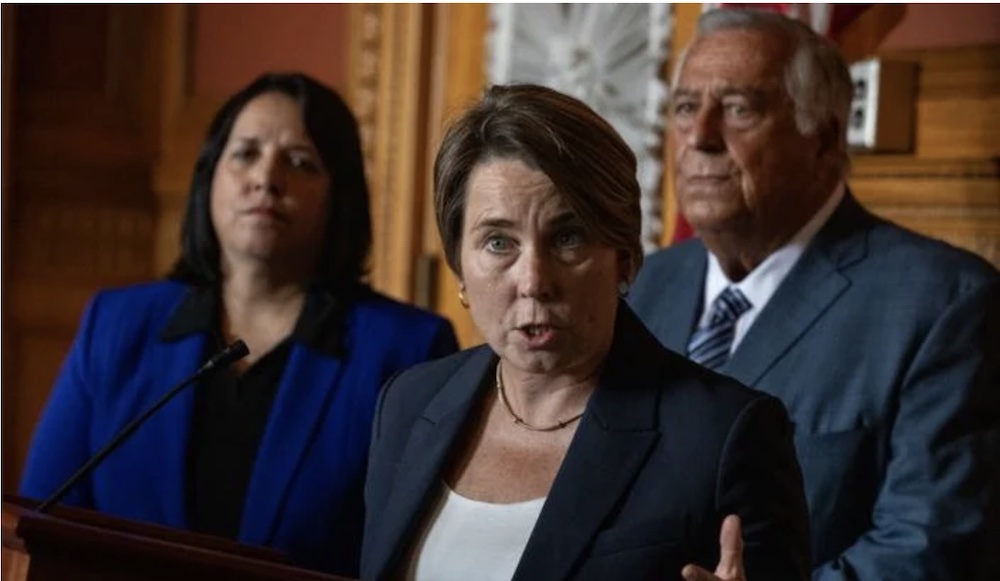latest
Massachusetts Senate Loads Reform Bill With Shelter Reporting Requirements

By Colin A. Young
Top Senate Democrats are on board with many of the changes to the overburdened family shelter system that the House included in its funding and reform bill, but are also seeking to impose additional reporting requirements on the Healey administration in a $425 million bill expected to pass by Thursday.
Like the version that the House passed last week (H 58), the bill introduced by Sen. Michael Rodrigues on Monday (S 16) would fund the emergency assistance (EA) family shelter program through June and give the Healey administration new, but temporary, authority to restrict eligibility for state emergency shelters as well as permanent mandates aimed at tightening security.
Pushed to its limits over the last two years by an influx of migrant families and a rise in homelessness here, the system ran out of money at the end of January and the administration said it could not pay new bills until more funds are approved. The Legislature already approved about a half-billion dollars in direct appropriations and one-time funds for the EA system in fiscal 2025. In fiscal year 2026, which starts this July, policymakers are hoping to see fewer people in shelters and less state spending on the system.
“I hope the system will continue the trend that we’ve seen recently of more people exiting the system than entering the system, people become sustainably employed, families are moving out, they are getting jobs, they are getting the work permits and finding other housing,” Rodrigues (D-Westport) told the News Service. “Keep in mind, again, over half of these in family shelters are long-term Mass. residents, it’s not just short-term legal migrants.”
The bill, offered by Rodrigues and not the Temporary Senate Ways and Means Committee he chairs, is largely in harmony with the House and is “very, very close to what the House had passed,” Rodrigues said. It would cap capacity in the EA system at 4,000 families for the period Dec. 31, 2025, through Dec. 31, 2026 (there were just more than 6,000 families relying on the EA system for shelter at the end of January), reduce the maximum length in an EA shelter from nine to six consecutive months, and make temporary respite sites available to families that appear eligible for the EA system for up to 30 days upon arrival in Massachusetts.
Rodrigues said the Senate wants to get a shelter funding bill onto Gov. Maura Healey’s desk as quickly as possible and he doesn’t anticipate any major issues that could complicate efforts to rectify the House and Senate versions.
“I think the House actually did a very good job on their bill and struck a good balance. Certainly there are individuals on both sides of the spectrum who aren’t happy, which often happens when you strike compromise and try to reach acceptable middle ground,” he said.
The Senate bill appears to mirror the House’s approach to addressing so-called presumptive eligibility by allowing the state to verify eligibility for shelter benefits during the application process. It would require that applicants for EA benefits prove Massachusetts residency and an intent to stay in Massachusetts by providing certain documentation. Unlike the House version, the Senate bill also has a section creating a waitlist for EA applicants who appear to be eligible “but who need additional time to obtain any third-party verifications reasonably required by the executive office.”
The Healey administration has said that a “presumptive eligibility” mandate was added to the EA system line item in 2005 requiring the state to place families into shelter based on self-attestations of eligibility. Administration and Finance Secretary Matthew Gorzkowicz and Housing Secretary Edward Augustus said last month that roughly half of all families that apply for shelter “are determined to be ineligible for the benefit based on their initial application materials and prior to being placed in the system” and that the state’s conservative estimate is that at least 6% of families are determined to be ineligible after being placed presumptively based on initial information they provided.
The secretaries said they were confident that removing that language and reverting to the prior practice of requiring pre-placement verification of eligibility for most families would “further reduce demand” on the system. The cost of one month of “presumptive eligibility” in the EA shelter system is between $10,000 and $15,000 per family, they said.
The Senate bill also requires that the Executive Office of Housing and Livable Communities provide EA shelter benefits only to “families consisting entirely of residents of the commonwealth who are citizens of the United States or persons lawfully admitted for permanent residence or otherwise permanently residing in the United States under the color of law, except in cases where a child in the family is a citizen of the United States, a person lawfully admitted for permanent residence or a person permanently residing in the United States under color of law,” according to a summary from Rodrigues’ office.
Under both the House and Senate bills, EOHLC would be allowed to deem families to be no longer eligible for shelter benefits if they have income exceeding 200% of the Federal Poverty Level for a certain period of time. The House would let the administration cut off benefits if a family has that level of income for three consecutive months, but the Senate bill proposes to make it four consecutive months instead.
The Senate bill also seeks greater information-sharing from the Healey administration.
Among a long list of new information points the Senate wants to see in the biweekly reports it requires from the administration is the total caseload of the emergency assistance shelter program, the number of families that applied for EA shelter in the previous 14 days, the number of families that were unable to provide the required verification during the application process in the previous 14 days, the number of families on the waitlist for EA shelter services, the total number of families that have exited the EA system in the previous 14 days (including a breakdown of those that exited due to the state’s time constraints), the total number of individuals in the EA shelter system who are employed, the average and median length of stay for families in the EA system, and “the total estimated cost of the emergency assistance shelter system for fiscal year 2026 based on projected changes to estimated caseload, capacity and other policy changes under this act.”
The Senate bill also calls for a report within 60 days from the Executive Office for Administration and Finance detailing the administration’s announced plan to phase out the use of hotels and motels for EA shelter sites by the end of 2025. And potentially eyeing additional changes to the state’s response to family homelessness, the Senate seeks to require the Healey administration to produce a detailed report by July 31.
That report, which would be developed by the administration in conjunction with the Massachusetts Interagency Council on Housing and Homelessness and family homelessness service providers, would be required to include “(i) detailed information on the most effective and cost-effective state programs and investments for the prevention of family homelessness; (ii) strategic and cost-effective changes to the emergency housing assistance program that prevent homelessness and promote stable rehousing; and (iii) the impact of various benefit levels for programs, including, but not limited to, the residential assistance for families in transition program and the HomeBASE rental assistance program, on the prevention of family homelessness and on ensuring stable housing for families transitioning out of the emergency housing assistance program.”
The Senate on Monday adopted an amendment deadline, giving senators until 2 p.m. Tuesday to propose changes to Rodrigues’ bill. The supplemental budget was placed on the Senate Calendar for action Wednesday, and senators have also been told to prepare for a potential formal session Thursday.
“Today, we will set the procedural stage for that budget to be considered and debated later this week, assuming we don’t have an Armageddonous snowstorm that prevents us from being able to do that,” Minority Leader Bruce Tarr told a visiting high school soccer team from the rostrum as he explained what business the Senate was conducting during Monday’s informal session.
Tarr and the caucus of five Senate Republicans last month proposed a series of changes to “course-correct” the state shelter system amid public safety concerns and mounting costs. Many of those ideas turned into amendments filed by Republican representatives last week, including unsuccessful attempts to address the Supreme Judicial Court’s 2017 Lunn decision by allowing state courts and law enforcement to honor U.S. Immigration and Customs Enforcement detainers in the case of violent offenders.
“This is about the day to day situation that we see in the courts where folks are being released after being charged and, in some cases, convicted of serious crimes. … This is about a selective group of people that pose a threat to public safety,” Tarr said in January.
The House avoided having to take a roll call vote on any of the ICE-related amendments when Democrats deemed the proposals to be “beyond the scope,” a parliamentary ruling that foreclosed the possibility of even taking up the amendments for recorded votes. Ultimately, every Republican voting was opposed to the shelter spending bill in the House, as were Democrat Reps. Colleen Garry and David Robertson.






